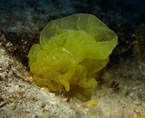| Home |
| Acknowledgments |
| Conventions |
| Glossary |
| Maps |
| References |
| Links |
| Articles |
| Thumbnails |
| Species
list |
| Family |
| Next
species |
Additional Photos

rhinophores

hood

eggs?

associated alga

Melibe sp. #2

| Maximum size: about 50 mm. Identification: This is a translucent-yellow species frosted with opaque-yellow flecks and with white flecks on its tubercle and rhinophore tips. It has three pairs of nearly spherical cerata, the posterior pair much smaller than the anterior two. (Note 1) The surfaces of the cerata and body are covered with low conical tubercles which grade into elongate papillae on top of the oral hood. The oral hood is small with short tentacles. The rhinophores are long and lack posterior crests on their stalks. The cups surrounding the rhinophore clubs are tuberculate and a line of small tubercles runs down the posterior edge of each rhinophore stalk. Natural history: Melibe sp. #2 is known from one animal found crawling on coral rubble at 12 m (39 ft), at an exposed site. It probably lays an elevated, spiral egg mass (assuming the photographed mass is from same species). (Note 2 ) Distribution: Oahu: perhaps, also known from the Philippines? (Note 3 ) Taxonomic notes: It was first recorded in Hawaii from Kanaloa Bay, Oahu by Sabina Alistar on April 6, 2024. Photo: Sabina Alistar: about 50 mm: Kanaloa Bay, Oahu; April 6, 2024. Observations and comments: Note 1: One ceras from each pair has been autotomized in the photographed animal (right one in anterior pair, left one in posterior two pairs). There's also a hint of a fourth, even smaller, pair in the first photo. Note 2: Like Melibe sp. #1, perhaps this species is mimicking the alga it's associated with (Sarcinochrysis marina). Sabina reported: "They're very easy to confuse with the yellow blobby algae that are all over the place." Note 3: A similar animal from the Philippines is transparent-white rather than yellow. (see photo by Franca Wermuth-Vezzoli) |
| Thumbnails |
Species
list |
Family | Next species | Top |